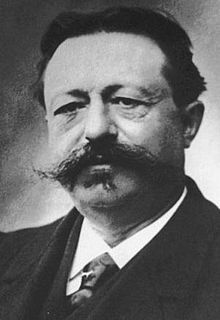Nizier Anthelme Philippe
| Nizier Anthelme Philippe | |
|---|---|
 |
|
| Born |
25 April 1849 Le Rubathier, Loisieux, Savoy, France |
| Died | 2 August 1905 (aged 56) L'Arbresle, Rhône, France |
| Nationality | France |
| Other names | Maître Philippe Maître Philippe de Lyon Master Philippe of Lyon |
Nizier Anthelme Philippe was born on April 25, 1849 in Le Rubathier, Loisieux, Savoy, France, the son of peasants, and died August 2, 1905 in L'Arbresle, Rhône, France. Nizier Philippe is a mystic and French healer. His mother was Mary Vachot (1823-1899) and his father was Joseph Philippe (1819-1898). He was also known as "Monsieur Philippe", "Maître Philippe" (i.e., Master Philippe) or "Maître Philippe de Lyon" (i.e., Master Philippe of Lyon).
From the age of fourteen he stayed with his uncle Vachod, a Butcher in Lyon. He gained a reputation as a healer by the age of thirteen. He married Jeanne Julie Landar (1859–1939) on 6 October 1877 in L'Arbresle. He had a daughter, Jeanne Marie Victoire, born on 11 November 1878. She died on 29 August 1904.
He went to St Petersburg where he was awarded his Doctor's Diploma in recognition of extraordinary feats of remote healing conducted in St Petersburg.Grand Duchess Militza Nikolaevna of Russia later introduced Philippe to Empress Alexandra Feodorovna of Russia in 1901, and Philippe had great influence over the imperial couple, until 1903 when he left Russia.
In October 1884 he presented a paper (published in French) entitled "Principles of Hygiene applicable in Pregnancy, Childbirth and Infancy" at the University of Cincinnati, Ohio. In recognition of this the University conferred a Doctorate of Medicine on him. Many other academic and social honours were conferred on him during the 1880s and 1890s in France and Italy.
Nizier Philippe treated thousands of people without asking money or anything; except asking some efforts to do good to others.
He received various attacks from the media, physicians or politicians in France and Russia; some critics, especially in Russia, accused him of using occult science to heal people. He was four times on trial for illegal practice of medicine between 1887 and 1892 and was acquitted, and left in peace from that date. But he also received the admiration of people of all ages, including the friendship of prestigious members of the European Courts (being close to Tsar Nicolas II, the king of Italy, the Austrian emperor Franz Joseph I, the German emperor Wilhelm II, the king of United Kingdom Edward VII) and of some distinguished members of the esoteric scene of the early twentieth century, including Dr. Gérard Encausse (Papus) and Dr. Emmanuel Lalande (Dr. Marc Haven), George Descormiers (Phaneg) and Yvon Leloup ().
...
Wikipedia
